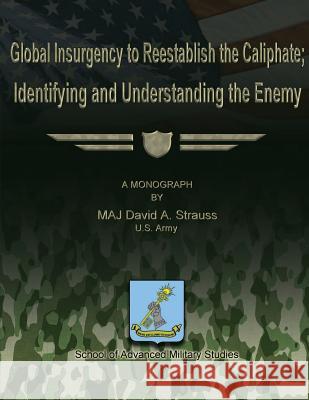Global Insurgency to Reestablish the Caliphate; Identifying and Understanding the Enemy » książka
Global Insurgency to Reestablish the Caliphate; Identifying and Understanding the Enemy
ISBN-13: 9781480022775 / Angielski / Miękka / 2012 / 82 str.
Global Insurgency to Reestablish the Caliphate; Identifying and Understanding the Enemy
ISBN-13: 9781480022775 / Angielski / Miękka / 2012 / 82 str.
(netto: 75,77 VAT: 5%)
Najniższa cena z 30 dni: 80,00
ok. 16-18 dni roboczych
Bez gwarancji dostawy przed świętami
Darmowa dostawa!
Since the attacks on September 11, 2001, the United States (US) has waged a Global War on Terror (GWOT) based upon the flawed strategy of countering a tactic, terrorism, as opposed to a strategy built on understanding and identifying its enemy. By focusing exclusively on terrorist organizations, the US failed to recognize the broader-based movement of establishing a dominant Islamic world power. Analysis should have been conducted encompassing the ways, means and ends of a known adversary, such as Islamic fundamentalists. Using this group as a source of comparison, this monograph demonstrates how other diverse groups, operating with different ideological ways but using similar means of technology, are attempting to achieve a common ends; the reestablishment of the Caliphate. There is no "one thing" that causes, allows or facilitates the situation. It is the relationship between the various actors, agents and artifacts that contributes to understanding the system and creates the environment where conflict is probable. Germane to this article is the assemblage of Western culture based on a liberal-democratic politics and an Islamic culture based on the Qur'an, Shari'a and the Sunnah. Where these two cultures meet there is, to quote Huntington, a "Clash of Civilizations." Where GWOT focuses on countering a tactic, terrorism, it fails to address the ideology which draws upon Islam for its legitimacy. It requires critically analyzing how Islam is able to give some form of legitimacy to those who would do Western nations harm, and how groups not normally seen as adversaries hold to the same theocratic ideology. The internet provides a forum for loosely interconnected, semi-independent groups to maintain contact with one another and with members of other terrorist groups, providing dispersed organizational actors the ability to communicate swiftly and coordinate effectively. Where once insurgencies were forced to rely on bank robberies, blackmail, ransoming hostages and physical intimidation, fund-raising is now as simple as entering credit-card information on a website. With its anonymity and vastly diverse reach, the internet has become an integral tool in recruitment drives for active fighters, suicide bombers, and promoters to advance the ideology and cause. There is a real danger in dismissing the manner in which terrorist organizations have used technology, specifically the internet, to further their agenda and disregarding the potential to harm Western nations. There are those within the intellectual community that believe Muslims countries are too diverse to ever unite as a single nation-state. If Islam is too fractional, too nationalistic, the logistics and coordination too overwhelming for a Caliphate to be established in this day and time, then how does one explain its establishment 1400 years ago? Finally, the West must recognize its own culpability in the actions of those who have attacked Western nations. Where others have pointed to Western colonization and the exploitation of Muslim nations as a contributing factor in attacks upon Western nations, this monograph concentrates on how Western concepts of toleration and globalization have shaped the discussion of Islam in such a fashion that to associate terrorist and Muslims, or Islam, has become a form of hate-speech. The term "Islamaphobia" sufficiently stifles discourse and criticism. When tolerance becomes a weapon, then the current concept of tolerance needs to be reexamined.
Zawartość książki może nie spełniać oczekiwań – reklamacje nie obejmują treści, która mogła nie być redakcyjnie ani merytorycznie opracowana.











